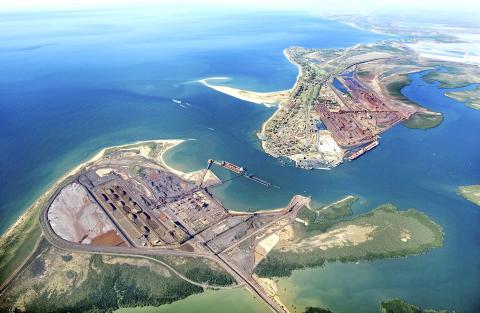Mining giant BHP Billiton yesterday delayed the expansion of its huge Olympic Dam project as it posted a 34.8 percent slump in annual net profit in a sign the global slowdown is hurting commodities.
The world’s biggest miner put plans to grow the copper and uranium mine in Australia on hold after a 15 percent plunge in underlying earnings due to softer prices for most of its products throughout the year.
BHP’s first profit drop in three years to US$15.42 billion is a significant reversal of fortunes for the company following a record US$23.6 billion profit last year — the largest ever recorded in Australian corporate history.

Photo: Reuters
Though BHP achieved record annual production at 10 of its operations including its flagship west Australia iron ore business, slowing global growth and uncertainty over the outlook hit commodity prices, undercutting profit.
“Concerns surrounding the stability of the eurozone and the decline in economic activity that accompanied the managed slowdown of growth in China led to significant market volatility in the 2012 financial year,” BHP said.
“In the short term, we expect volatility in commodity markets to persist as temporary weakness in the manufacturing and construction sectors across all key markets is expected to weigh on market sentiment,” the mining firm added.
As a result, BHP chief Marius Kloppers said the company would explore a “less capital-intensive design” for its mammoth multi-billion-dollar Olympic Dam expansion, which once completed would make it the world’s largest open pit mine.
“We will continue to work on technological and design alternatives that have the potential to substantially improve the economics of the expansion,” Kloppers said in a statement to the stock market.
In the medium term, BHP said it expected a “measured improvement in the external environment” beginning in the first half of the next financial year, driven particularly by growth in China.
The company declared a dividend of US$1.12 per share, up 11 percent on the previous year, with the stock finishing 0.33 percent lower at A$33.16.

SEEKING CLARITY: Washington should not adopt measures that create uncertainties for ‘existing semiconductor investments,’ TSMC said referring to its US$165 billion in the US Taiwan Semiconductor Manufacturing Co (TSMC, 台積電) told the US that any future tariffs on Taiwanese semiconductors could reduce demand for chips and derail its pledge to increase its investment in Arizona. “New import restrictions could jeopardize current US leadership in the competitive technology industry and create uncertainties for many committed semiconductor capital projects in the US, including TSMC Arizona’s significant investment plan in Phoenix,” the chipmaker wrote in a letter to the US Department of Commerce. TSMC issued the warning in response to a solicitation for comments by the department on a possible tariff on semiconductor imports by US President Donald Trump’s

‘FAILED EXPORT CONTROLS’: Jensen Huang said that Washington should maximize the speed of AI diffusion, because not doing so would give competitors an advantage Nvidia Corp cofounder and chief executive officer Jensen Huang (黃仁勳) yesterday criticized the US government’s restrictions on exports of artificial intelligence (AI) chips to China, saying that the policy was a failure and would only spur China to accelerate AI development. The export controls gave China the spirit, motivation and government support to accelerate AI development, Huang told reporters at the Computex trade show in Taipei. The competition in China is already intense, given its strong software capabilities, extensive technology ecosystems and work efficiency, he said. “All in all, the export controls were a failure. The facts would suggest it,” he said. “The US

The government has launched a three-pronged strategy to attract local and international talent, aiming to position Taiwan as a new global hub following Nvidia Corp’s announcement that it has chosen Taipei as the site of its Taiwan headquarters. Nvidia cofounder and CEO Jensen Huang (黃仁勳) on Monday last week announced during his keynote speech at the Computex trade show in Taipei that the Nvidia Constellation, the company’s planned Taiwan headquarters, would be located in the Beitou-Shilin Technology Park (北投士林科技園區) in Taipei. Huang’s decision to establish a base in Taiwan is “primarily due to Taiwan’s talent pool and its strength in the semiconductor

French President Emmanuel Macron has expressed gratitude to Hon Hai Precision Industry Co (鴻海精密) for its plan to invest approximately 250 million euros (US$278 million) in a joint venture in France focused on the semiconductor and space industries. On his official X account on Tuesday, Macron thanked Hon Hai, also known globally as Foxconn Technology Group (富士康科技集團), for its investment projects announced at Choose France, a flagship economic summit held on Monday to attract foreign investment. In the post, Macron included a GIF displaying the national flag of the Republic of China (Taiwan), as he did for other foreign investors, including China-based